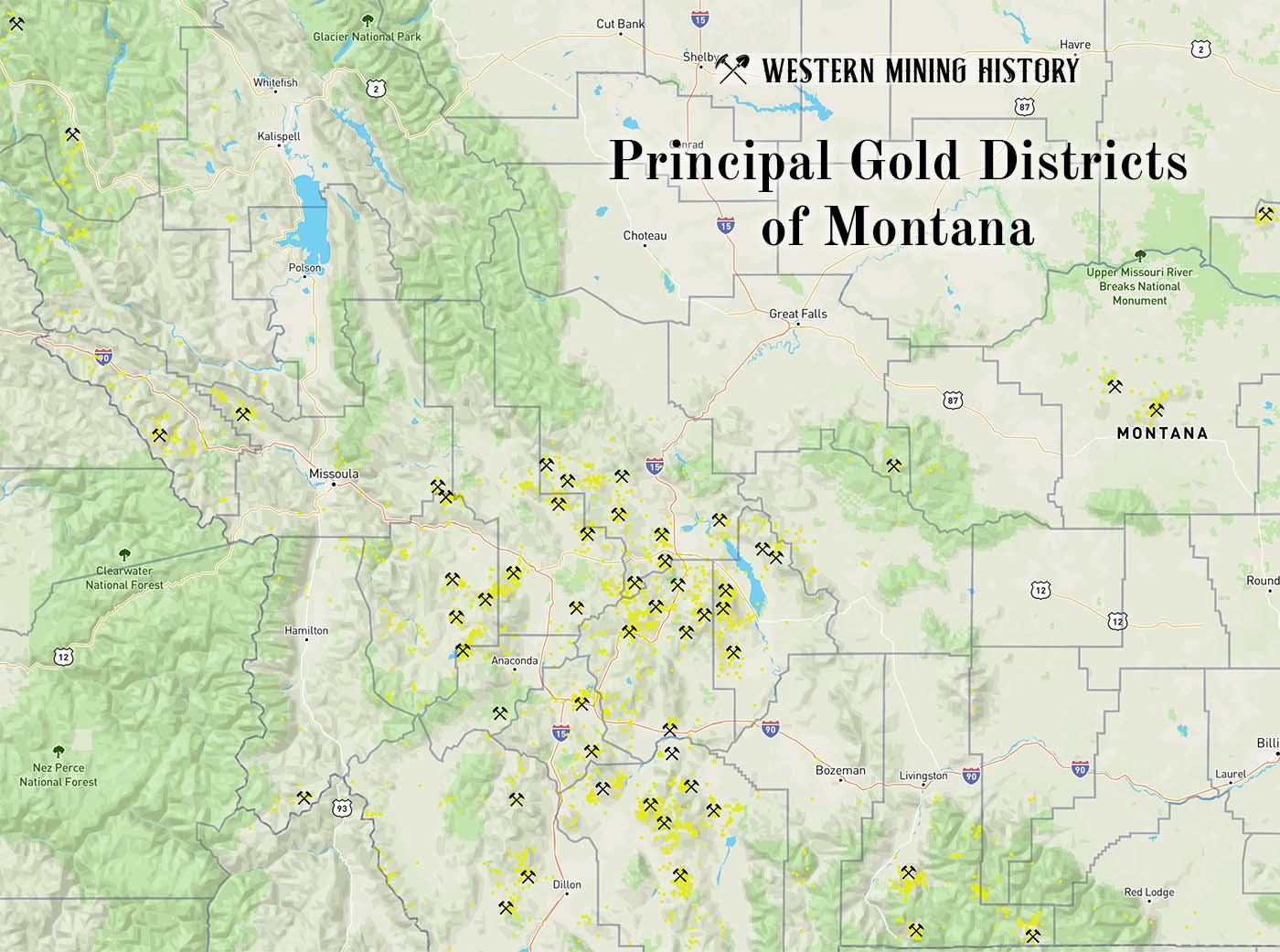The Blackmore Prospect is a molybdenum mine located in Beaverhead county, Montana at an elevation of 8,701 feet.
About the MRDS Data:
All mine locations were obtained from the USGS Mineral Resources Data System. The locations and other information in this database have not been verified for accuracy. It should be assumed that all mines are on private property.
Mine Info
Elevation: 8,701 Feet (2,652 Meters)
Commodity: Molybdenum
Lat, Long: 45.42778, -112.99389
Map: View on Google Maps
Blackmore Prospect MRDS details
Site Name
Primary: Blackmore Prospect
Commodity
Primary: Molybdenum
Location
State: Montana
County: Beaverhead
District: Pioneer Mountains
Land Status
Land ownership: National Forest
Note: the land ownership field only identifies whether the area the mine is in is generally on public lands like Forest Service or BLM land, or if it is in an area that is generally private property. It does not definitively identify property status, nor does it indicate claim status or whether an area is open to prospecting. Always respect private property.
Holdings
Not available
Workings
Not available
Ownership
Owner Name: Charles P. Mackenzie
Production
Not available
Deposit
Record Type: Site
Operation Category: Occurrence
Operation Type: Unknown
Discovery Year: 1955
Discovery Method: Unknown
Years of Production:
Organization:
Significant: N
Physiography
General Physiographic Area: Rocky Mountain System
Physiographic Province: Northern Rocky Mountains
Physiographic Detail: Pioneer Mountains
Mineral Deposit Model
Not available
Orebody
Form: IRREGULAR
Structure
Not available
Alterations
Not available
Rocks
Name: Quartz Monzonite
Role: Associated
Age Type: Associated Rock Unit
Age Young: Late Cretaceous
Name: Quartz Monzonite
Role: Associated
Age Type: Associated Rock
Age Young: Late Cretaceous
Name: Quartz Monzonite
Role: Associated
Age Type: Host Rock
Age Young: Late Cretaceous
Analytical Data
Analytical Data: ASSAY REPORT: MO - 0.209% (1958) 2ND ASSAY REPORT 1959: MO - 0.543% NO. 2 SHAFT. NO. 11 CUT - MO - 0.742%
Materials
Ore: Molybdenite
Comments
Comment (Deposit): FLOAT AND THREE QUARTZ VEINS CONTAIN BLEBS OF MOLYBDENITE.
Comment (Commodity): SAMPLES (3) TAKEN FROM NO. 1 CUT, OF 3 SAMPLES B - 3 WAS SENT FOR ASSAY CHECK (7/8 CUT ACROSS A 4.5 INCH QUARTZ VEIN).
Comment (Location): 1500 FT. NW OF PEAR LAKE DAM.
Comment (Workings): NO. 1 DISCOVERY SHAFT - 6 FEET BY 10 FEET BY 5 FEET DEEP, PARTLY SLOUGHED. {{ NO. 2 SHAFT - 12 FEET BY 12 FEET BY 6 FEET DEEP. {{ NO. 3 TRENCH - 3 FEET WIDE BY 3 FEET DEEP BY 12 FEET LONG, RUNS S 26 DEG. E IN SOIL AND ROCK DEBRIS, SLOUGHED. {{ NO. 4 PIT - 8 FEET BY 8 FEET BY 2 FEET DEEP, SLOUGHED. {{ NO. 5 PIT - 4 FEET DIAMETER BY 4 FEET DEEP IN SOIL AND GRANITE BOULDERS. {{ NO. 6 PIT - 7 FEET LONG BY 3 FEET WIDE BY 3 FEET DEEP, SLOUGHED, IN SOIL AND GRANITE BOULDERS. {{ NO. 7 PIT - 8 FEET LONG BY 2.5 FEET WIDE BY 2 FEET DEEP, IN SOIL. {{ NO. 11 CUT AND SHAFT IN GRANITE, SHOWS THREE SEPERATE QUARTZ VEINS. EACH VEIN STRIKES APPROXIMATELY N 70 DEG. E AND HAS A NEAR-VERTICAL DIP. THEY VARIED IN THICKNESS FROM 2 1/2 TO 5 INCHES. {{ NO. 12 CUT AND SHAFT - CUT RUNS N 75 DEG. W, 12 FEET LONG BY 5 FEET WIDE, 4 FEET DEEP. SHAFT IS 3 FEET BY 3 FEET BY 2 FEET DEEP AND PARTICALLY CAVED, IN SOIL.
Comment (Geology): MOST OF AREA IS COVERED BY GLACIAL MORAINE.
Comment (Deposit): SMALL MOLYBDENUM PROSPECT. VEINS ARE ALL LESS THAN 5 INCHES WIDE AND CONTAIN NO TUNGSTEN MINERALS (PATTEE, 1960) ; INFO.SRC : 1 PUB LIT
References
Reference (Deposit): 1959 DIREXPL USFS
Reference (Deposit): USBM RI 5552, P. 37
Reference (Deposit): 1958 DIREXPL USFS
Principal Gold Districts of Montana

In Montana, 54 mining districts have each have produced more than 10,000 ounces of gold. The largest producers are Butte, Helena, Marysville, and Virginia City, each having produced more than one million ounces. Twenty seven other districts are each credited with between 100,000 and one million ounces of gold production. Read more: Principal Gold Districts of Montana.